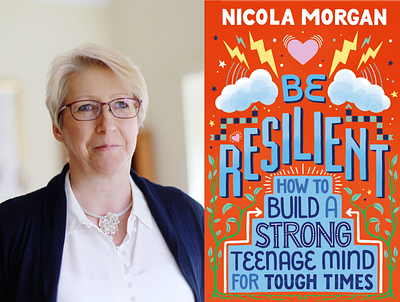Looking for all Articles by Nicola Morgan?
Five ways to build resilience for a new school year
Nicola Morgan, author of Be Resilient, offers five practical tips to help children and teenagers who are worried about returning to school

How does your child or teenager feel about going back to school after a long break?
While some will be excited and positive, others will be experiencing a range of emotions from mild anxiety to major fears. The longer the break, whether for illness or holiday, the harder it can be to return.
Young people start to remember the negatives: pressure, early mornings, the people who make them feel bad, the smell of toilets, bins and other people. Maybe last year wasn't a good one. Maybe fears are coming back. Change itself is scary – even when it's also exciting.
What can you do to build your child or teenager's resilience so they can bounce back into term?
The five building blocks of resilience
Be Resilient is based on five building blocks. Here are my suggestions of ways your child or teenager could put each one into practice for the start of this year. I've aimed the tips at young people but there's a lot in Be Resilient for adults, too!
Support Network
Think how you can improve your friendships this year.
There are no prizes for trying to do everything alone. Humans do better together.
Practical tip: This year, decide to focus on people you like and ignore the rest. The people you like are the ones who can make a positive difference so they're the only ones deserving headspace.
Skills
What will you grow this year?
The more skills and knowledge we grow, the greater our confidence. Then, if something goes wrong, we know we can try again because we know that we improve with practice and effort. This is 'growth mindset'.
Practical tip: This school year, choose something to build knowledge in. Ask your school librarian for the best books on the topic.
Coping strategies
What will you choose?
Avoiding our fear is a negative coping strategy. We need positive strategies when things feel bad – things like asking for help, sharing feelings with a friend or just taking a break before trying again.
Practical tip: When you're upset, physical activity is great medicine. It takes your mind off the distress and makes you feel better physically and mentally. Or, if you can't do that, bury yourself in a book you love!
Courage
What will you say when you're feeling scared?
Courage means feeling anxious or scared or uncertain but trying the thing anyway. Brave people feel scared but they know how good they'll feel if they succeed – and if they don't, they try again and feel even better.
Practical tip: Imagine you're a coach giving a pre-match talk to a team. What would you say to them? Now say the same to yourself! Be your own coach!
Your future
Make the right choices for you.
This is about making the right choices for you, no one else. It's about being self-aware and trying to take steps in the direction you want to go – but not being afraid to change direction.
Practical tip: each day make one decision that is for your future. It could be to listen in class, ask a question, put your phone away while doing homework, ask for help or read a book. It could be easy or hard, but it is a choice for your future and therefore very important.
Resilience is about being kind but firm with ourselves: acknowledging our anxieties while reminding ourselves of our strength. Things might not always go brilliantly, but through determination, listening to teachers and getting support when needed, resilience is something everyone can learn.